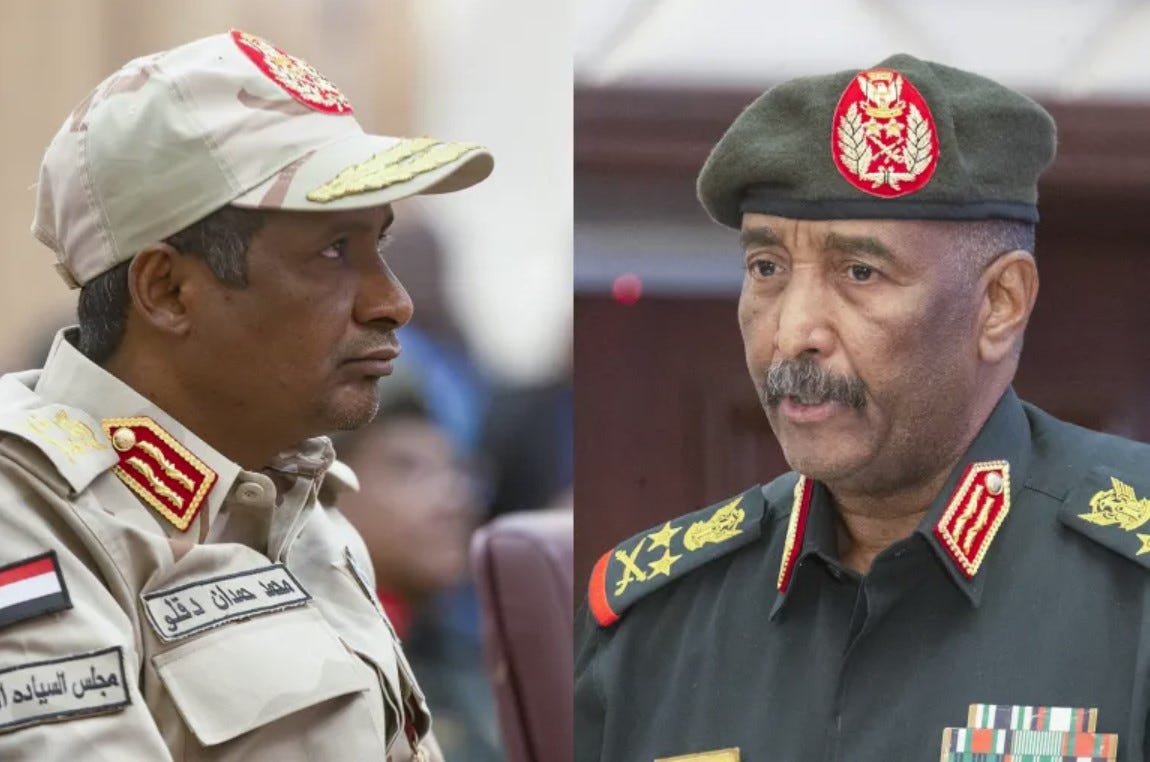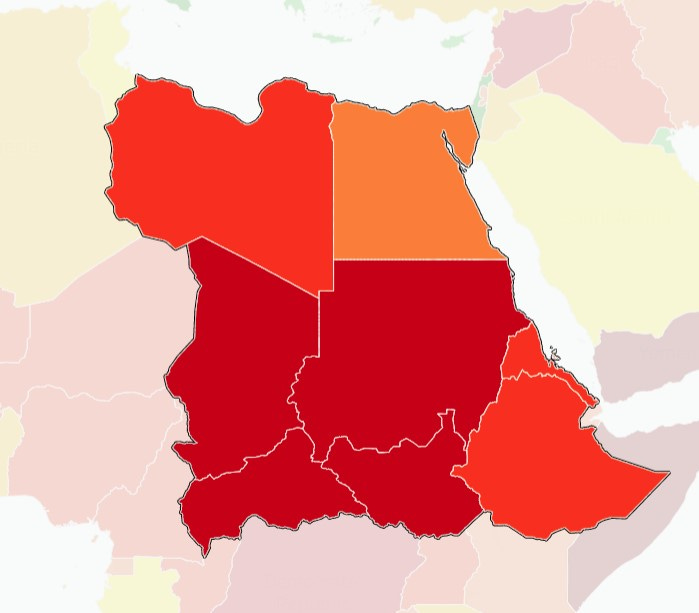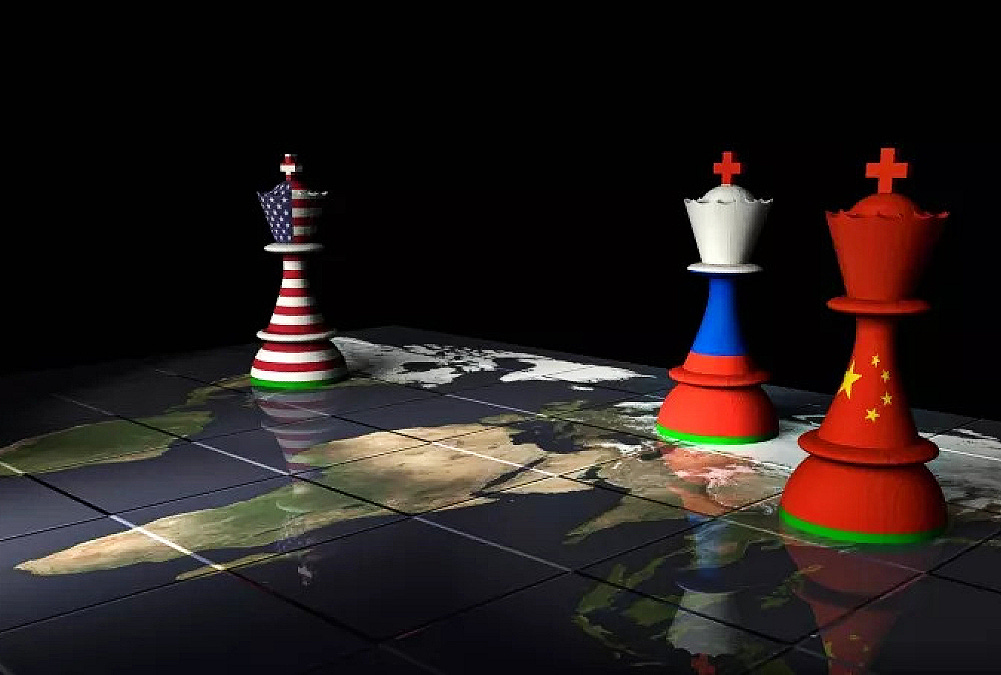Conflict in Sudan: Regional and International Aspects
Who is fighting? Who are the regional stakeholders? What does it mean in the context of Great Power Competition?
Roughly a week ago scenes of violence in Sudan began to be broadcast around the world. Pictures of members of a paramilitary group known as the Rapid Support Forces (RSF) taking over buildings and government facilities painted a portrait of an impending civil war and humanitarian disaster in a country that knows both of those things all too well. For most working-class Americans, the country of Sudan has not gotten any of their attention outside of cruise missile strikes during the Clinton administration or celebrity campaigns to bring awareness to the genocide in Darfur in the early 2000s. In the last 48 hours, American special operations forces evacuated American State Department personnel from the U.S. Embassy in the Sudanese capital of Khartoum, and given our nation’s state of hyperpolarization, this has already begun to turn into a divisive mess with one side decrying “another retreat” and the “abandonment of Americans in Sudan.” Regardless of the polarization, the events in Sudan have drawn the interest of Americans, at least temporarily. With this in mind, it is purpose of this post to provide a quick primer for folks trying to orient themselves to the crisis and determine where their interests may lie. This stream of consciousness will be divided into three sections which will start by defining what is happening inside of Sudan, then zoom out to the regional level, and lastly, zoom out again to view the crisis through the lens of Great Power Competition.
Who is Who in Sudan and Why Are They Fighting?
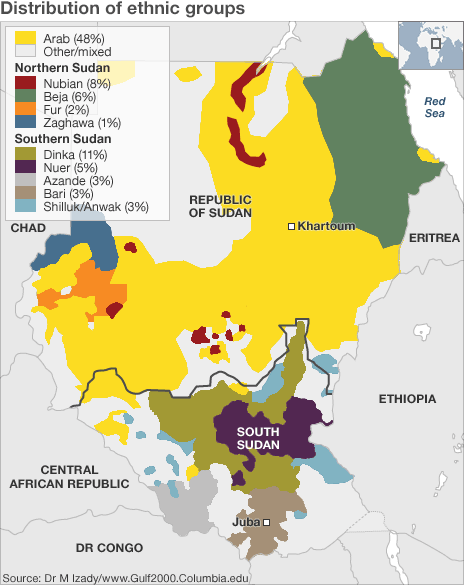
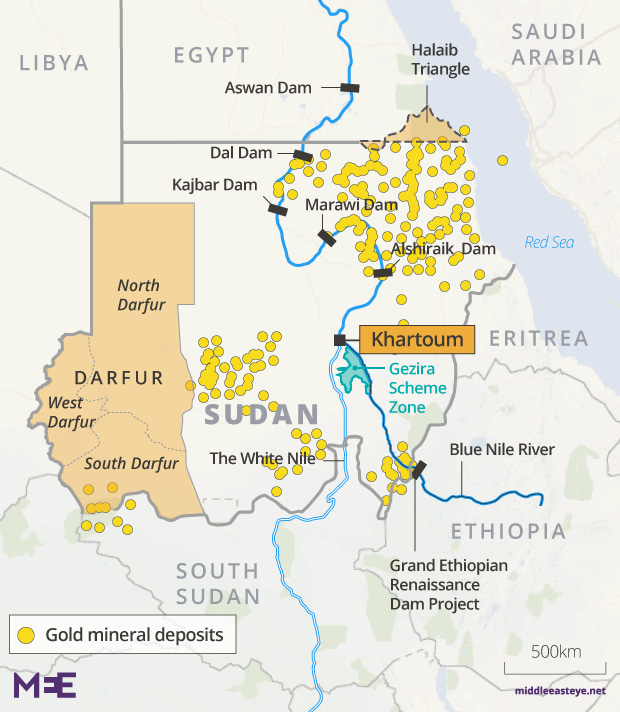
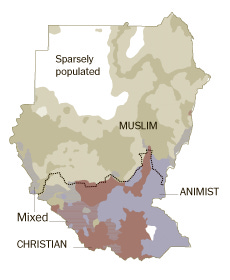
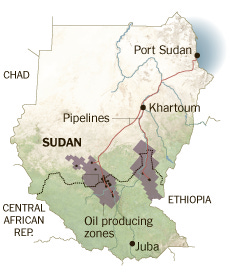
Before we get into the individuals and groups that are at odds with each other in Sudan to the point of bringing the country to the brink of another civil war, it is important to understand the timeline that got us to this point. Sudan has long been plagued with strife resulting from a variety of factors including political and economic marginalization, ethnic and religious divisions, and competition over natural resources. The more recent and relevant conflicts to today’s issues are the Sudanese Civil War which lasted from 1983-2005 resulting in the deaths of more than two million people with millions more displaced. The previously mentioned Darfur crisis happened late in this civil war and cost the lives of hundreds of thousands of people alone. The conclusion of this civil war laid the foundations for the independence of South Sudan in 2011 which would strip Sudan of 75% of its oil resources making prospects for further economic growth and political stability bleak. From 1989-2019, Sudan was ruled by Omar Hassan al-Bashir until he was removed from power in 2019 as the result of a coup d’état which was orchestrated by the two main individuals at odds in the current crisis; Sudanese Army General Adbel Fattah al-Burhan and RSF General Mohamed Hamdan Dagalo who is also known as “Hemedti.”
Until the recent outbreak of violence, al-Burhan was in charge of the country with Dagalo as his deputy. Al-Burhan has spent his life as a solider in the Sudanese Army while Dagalo rose from once being a camel herder into the position of leading the RSF. Prior to the 2019 coup, the country was working through the delicate transition from military rule to civilian rule, but that was upended as a result of the coup. In recent months, conversations have been ongoing regarding the integration of the RSF into the Sudanese military, and this led to a framework agreement which would place Dagalo on equal footing with al-Burhan. This integration is a big deal because the RSF is a paramilitary group which was formerly known as the Janjaweed militia. If that name sounds familiar to you, it is likely because the Janjaweed were responsible for some of the most horrific atrocities that took place during the Darfur region genocide in the early 2000s. The Sudanese government relied on the Janjaweed to do its bidding in Darfur and in 2017 passed a law that effectively rebranded them as a legal security entity known as the RSF. Essentially, what this boils down to is a struggle between a Dagalo led RSF and a al-Burhan led Sudanese military for control over the country. None of this is happening in a vacuum and with Sudan being an important exporter of resources despite being in one of the worst neighborhoods in the world for failed states; regional and international stakeholders in Sudan’s stability will act accordingly. In the next section we’ll explore the regional actors, pressures, and considerations.
Regional Stakeholders and Impact
At first glance Sudan may not seem like an economically significant spot on the map, but its ability to produce food like few Middle Eastern or North African countries can makes Sudan important for many countries in the region. As far as exports are concerned, food related products account for roughly 30% of Sudan’s exports; most of which are destined for Saudi Arabia, Egypt, United Arab Emirates, and the People’s Republic of China. Food exports aside, half of Sudanese exports are gold shipped to the United Arab Emirates. In addition to this, Sudan’s access to the Red Sea and Port of Sudan makes it an attractive location for strategic and regional power plays.
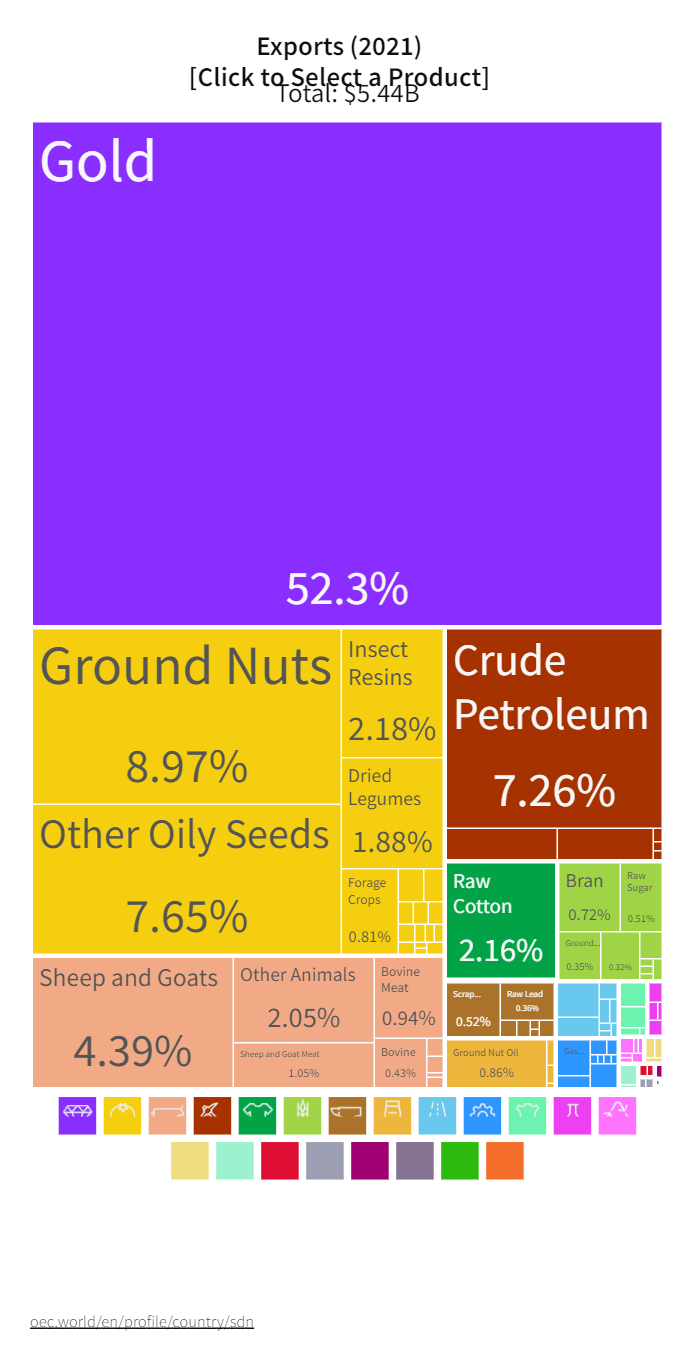
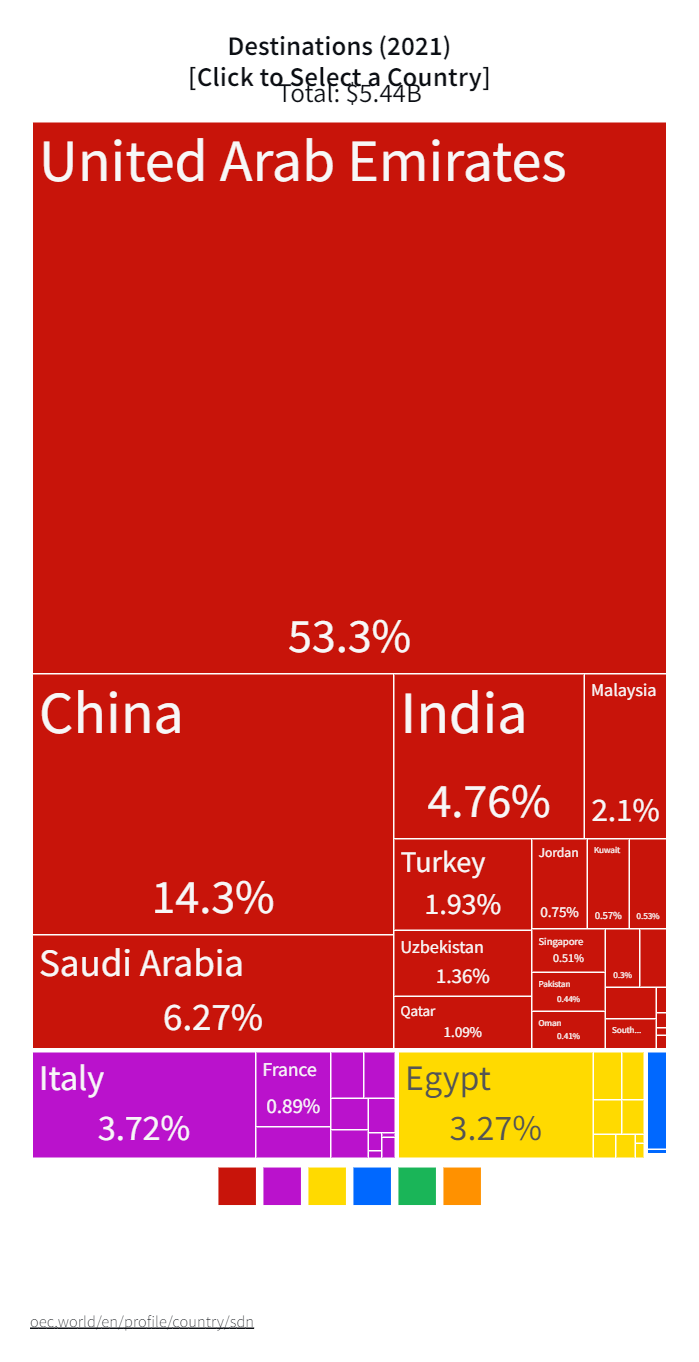
Exports aside, the Sudanese military has close defense ties with the Egyptian military while the RSF has recently received support from Libyan military leader Khalifa Haftar. If you tried to find a less stable region across the board in the world, it’d be difficult to find one that’d be worse than the Horn of Africa at the moment. Sudan finds itself surrounded by states in the middle of political upheaval and instability. The region is essentially a sea of failed states which makes it a premier candidate for human suffering, safe havens for violent non-state actors, and cascading transnational conflict. According to the fragile states index, half of Sudan’s neighbors are in the top ten for worst government stability while Egypt is the lone neighbor outside of the top 20 by the same measurement.
Considering the importance Sudan has to some of its biggest trading partners, the low likelihood of either side having a decisive victory, and the prospects for regional instability; most countries have opted for pressure on both sides to calm down. Regionally the biggest voices asking for a stand down that have ties to both the Sudanese government and the RSF have been Saudi Arabia and the United Arab Emirates.
Lens of Great Power Competition
At the moment, it could be argued that the Russians are the most invested in the conflict on the ground, at least at a glance. It has been widely reported that the Wagner group has been supporting the RSF with surface to air missile supplies. This isn’t shocking, because the Wagner group has been closely aligned with Libyan leader Haftar which also has supported the RSF. It is important to note, however, that the Russian military has provided support and weapons to the Sudanese military for a long time and has done so since al-Burhan has been in power. Russia’s role in the conflict may be the most overt, but its ambitions are difficult to ascertain at the moment as it appears to be hedging bets.
The United States’ relationship with Sudan has been a bumpy road for decades due to issues relating to terrorism and human rights abuses. Until 2020, the United States had Sudan labeled as a state sponsor of terrorism, and in the past had put sanctions in place in response to atrocities in Darfur. Without major trade ties, the primary interests of the United States are stability in the region and the prevention of safe havens for non-state actors due to failed states. Thus far the actions of the Biden administration signal that the United States is in favor of a stand down, but that could change based on Russian actions or interests. For example, if Russia were to signal interest in establishing military bases in Sudan, that would likely provoke a different tone.
The PRC, resources are always going to be at the top of their list when looking abroad, but what is likely on the line for them in this situation is diplomatic prestige that could be received if they can play the role of mediator more effectively than other powers in the world. Fresh off of brokering a deal between Saudi Arabia and Iran, this sort of effort in Sudan wouldn’t be a surprise but could be risky. A number of African states have recently voiced frustration with PRC activities on the continent which have impacted their trust. Appearing overly interested in gaining influence in Sudan could further aggravate relations elsewhere on the continent which have recently become tense.




